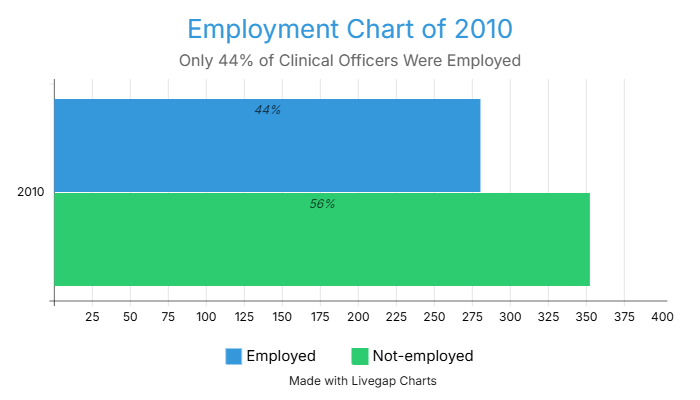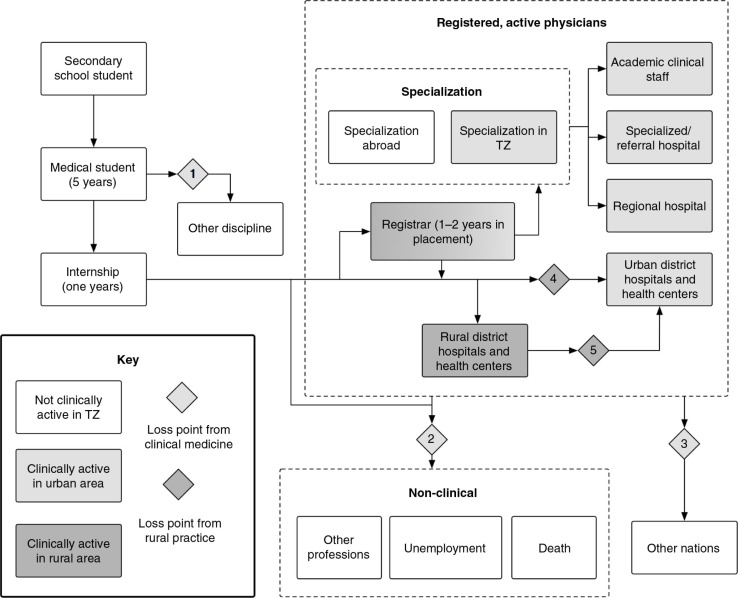For decades, clinical officers have formed the foundation of Tanzania’s healthcare system, especially in rural and underserved regions.
These mid-level medical professionals diagnose illnesses, manage patient care, and often step in where doctors are unavailable.
Yet, despite their critical role, thousands of qualified clinical officers today remain unemployed — a troubling paradox in a country still struggling with healthcare access.
So, what’s driving this disconnect?
The Push for More Doctors — At What Cost?
In an effort to address Tanzania’s severe shortage of doctors, the government expanded medical education rapidly.
Between 1991 and 2015, the number of medical schools rose from just 1 to 11. Annual admissions to medical programs jumped from 55 to over 1,500 students[1].
While the intention was good, the rapid increase in doctor training did not come with a corresponding rise in job opportunities.
In fact, a 2010 report showed that only 280 out of 632 medical graduates received public sector postings — less than half.
As more doctors enter the job market, clinical officers are often passed over, even in areas where their skills are perfectly suited.

An Oversupply of Clinical Officers with Nowhere to Go
The situation is worsened by the fact that Tanzania is also producing more clinical officers than it can employ.
Training institutions have expanded, but the job market has not kept up. Many colleges operate under-resourced, with some reporting instructor-to-student ratios as high as 1:67 — far beyond the recommended 1:25[2].
The result? A growing number of clinical officers graduate every year, only to find themselves idle or searching for work outside their field.
Career Growth: A Road to Nowhere?
Clinical officers also face systemic barriers to professional advancement. While some go on to become Assistant Medical Officers (AMOs), the path beyond that is unclear and limited.
A 2021 study found that many AMOs expressed frustration over stalled careers and a lack of transition opportunities into roles such as full medical doctors[3].
This career stagnation not only discourages those currently in the field but also deters new entrants, threatening the sustainability of the profession.

Bureaucracy and Delays Are Wasting Talent
Even when positions exist, government recruitment systems are slow and often opaque. Clinical officers can wait months — sometimes years — before receiving a public service posting.
Others abandon the process altogether and pursue work in the private sector, NGOs, or outside the country.
In the meantime, rural health centers go understaffed. This administrative inertia is costing the nation valuable human resources and, more importantly, costing lives.
Why This Matters: The Human Cost of Inaction
While policymakers debate hiring priorities, communities suffer. Clinical officers have historically filled the gap in Tanzania’s overburdened health system, especially in hard-to-reach areas.
Without them, access to basic healthcare weakens, child mortality rises, maternal care suffers, and preventable diseases go untreated.
This is not just an employment issue — it’s a public health emergency in slow motion.
What Needs to Happen Now
The problem is clear, and so are the solutions. Tanzania’s healthcare system must take deliberate steps to reintegrate clinical officers into its workforce strategy:
- Rebalance hiring policies to include clinical officers in national workforce planning.
- Streamline recruitment processes to reduce delays and backlogs.
- Invest in quality training and supervision to ensure new graduates are job-ready.
- Create career progression pathways that recognize clinical officers’ contributions and provide long-term motivation.
Conclusion
Clinical officers are not relics of the past — they are essential to the future of healthcare in Tanzania.
If we continue to train them without employing them, we not only waste taxpayer money but also put public health at risk.
It’s time to shift focus from quantity to strategy — from short-term fixes to long-term systems. Because no healthcare system can function effectively while sidelining the very professionals who keep it alive.




